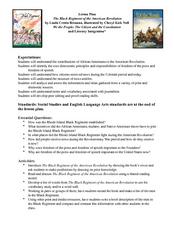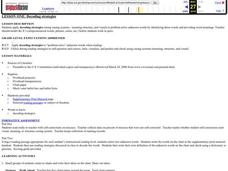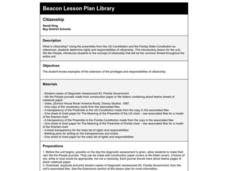Pacific University Oregon
Civil Rights: US History
To gain an understanding of the Civil Rights Movement of the 1960s, class members investigate the Jim Crow Laws, the Emancipation Proclamation, the 13th, 14th, and 15th Amendments of the US Constitution, and the 1898 Supreme Court case,...
Constitutional Rights Foundation
The Troubled Elections of 1796 and 1800
Congress does more than create new laws. Political scientists delve into the elections of 1796 and 1800 to understand how political parties, the Electoral College, and personal agendas affected the election process. The resource also...
New York State Education Department
US History and Government Examination: June 2011
Those who lived during the Great Depression could clearly draw a line between the roaring 1920s and the desolation of the following decade. Class members examine these two periods and compare them using an essay question prompt and...
Curated OER
We the People: The Citizen and the Constitution: The American Revolution
The contributions of African-Americans to the American Revolution are the focus of this Social Studies and language arts lesson. After reading and discussing Linda Crotta Brennan’s The Black Regiment of the American Revolution, class...
National Constitution Center
The Development and Application of the First Amendment
What are the limits on freedom of speech? While a cherished right in the Constitution, it is not unbridled. Budding historians consider what checks should exist on this liberty using news stories, court cases, and College Board prompts.
Judicial Learning Center
Judicial Independence: What’s Wrong with This Court?
Why is it important for judges to operate independently of politics or other branches of government? Scholars ponder the question as they examine video clips, case studies, excerpts of the US Constitution, and an interactive computer...
Judicial Learning Center
Separation of Powers/Qualifications of Office
Time to work together in class to understand the separation of powers as well as the qualifications for office! The resource includes terms to review for pre-knowledge before beginning instruction. Following the review, pupils work on a...
Constitutional Rights Foundation
The Census in US History
The census has been a part of the American landscape since the Constitution was written; however, it does have a history of controversy. Class members use a guided reading and simulation activity on developing census questions to...
Judicial Learning Center
Article III WebQuest
Why is Article III of the constitution so significant? Pupils discover the importance of Article III and how it relates to past as well as current events by completing Internet research using a provided handout. They learn everything...
Museum of the American Revolution
Hamilton Was Here: Rising Up in Revolutionary Philadelphia
Hamilton may be a hit Broadway show, but there is so much more to learn. An eight-unit resource guides young historians through the life of Alexander Hamilton and the Revolutionary War. The lessons include hands-on-activities, writing,...
Curated OER
Decoding Strategies
Young readers apply decoding strategies to identify unknown words. In this reading lesson plan, they read the Preamble and practice using decoding strategies. Small groups rotate to five charts that have questions regarding the...
Curated OER
US Constitution And Amendments
Pupils become familiar with the US Constitution and consider how it affects their lives. They research the Preamble to articulate the purposes of government, compile collages, and research the separation of powers within each branch of...
Curated OER
Citizenship
Fifth graders read the preamble of the U.S. and Florida Constitutions. They discuss vocabulary definitions surrounding the concept of citizenship. They discuss and write about the rights and responsibilities of citizens and apply their...
Curated OER
Understanding The Preamble
Students explore the Preamble of the U.S. Constitution. In this government instructional activity, students write a preamble to encourage cooperation in their classroom as they study the Preamble of the U.S. Constitution.
Curated OER
Do We Need a New Constitutional Convention
Learners analyze the adaptive nature of the U.S. Constiution. For this Amendments lesson, students listen to their instructor present a lecture regarding the amendment process. Learners respond to question regarding the amendment process...
Curated OER
Should the United States Have a Central Bank?
Students assess the validity of a national bank. They study the importance of McCullough v. Maryland. They review the arguments of Hamilton and Jefferson. They analyze the Tenth Amendment and the debate over state v. federal power. They ...
Curated OER
Democracy: An Introduction.
Students study the U.S. Constitutional System and how it compares with forms of democracy that developed in ancient Greece and Rome. They list and explain the requirements it takes to form a society to be considered a nation.
Curated OER
Participating in State and Local Government
Students analyze the structure, organization, and powers of State legislatures. They outline the overall shape of the office of the governor.
Students analyze the structure of local governments as creations of the State. They describe...
Curated OER
Introduction to Farming in the United States
Learners discuss basic foods and what constitutes a well-balanced meal. They identify four basic food groups, and identify food sources, such as farms.
Curated OER
Why Does Congress Work That Way?
Students discover the powers of Congress. In this legislative branch lesson, students examine the legislative process as they analyze Article I of the U.S. Constitution. Students consider the powers of Congress as they define the role of...
Curated OER
Building a Human Rights Document
Students identify the issue of basic human rights, examine the importance of the UDHR, and compare it to United States Bill of Rights. They create a definition of human rights as a class. Students are divided into groups of four and...
Curated OER
Taking A Stand - Rules and Laws
Students explore the purpose of rules and laws in society, as well as some of the basic tenets of the Constitution that address equal rights for all citizens. Next, they examine historical examples of segregation and consider its impact...
Curated OER
Legislative Branch
Students analyze Article 1 of the Constitution. They respond to the Public Criticism E-Learning module.
Curated OER
What Is the Bill of Rights?
Students discuss the purpose of the Bill of Rights and the United States Constitution. In groups, they write about the ten amendments and their purpose. They re-word the Amendments in their own way and answer discussion questions to end...
Other popular searches
- United States Constitution
- United Statesusus Constitution
- The United States Constitution
- Unites States Constitution

























